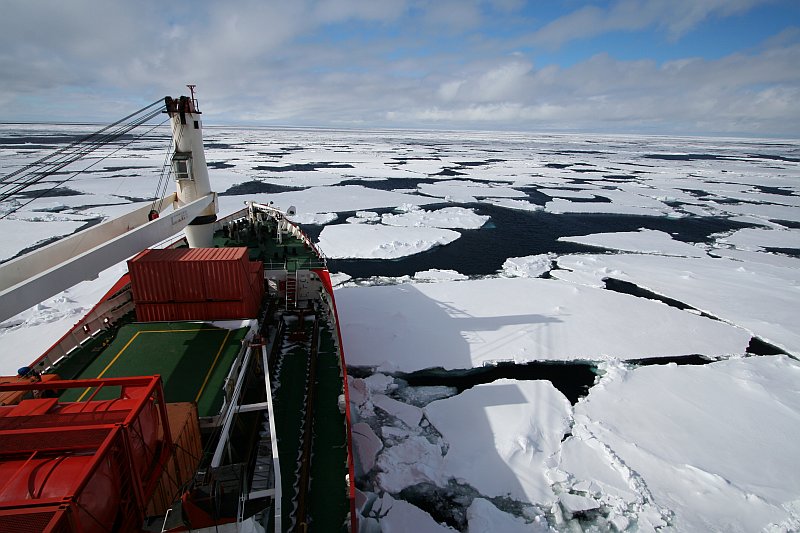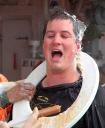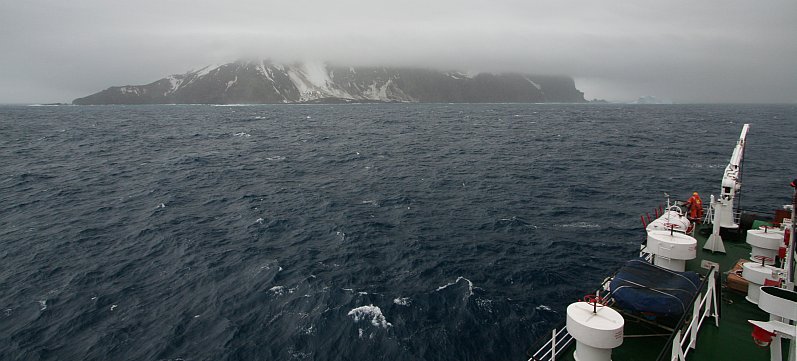Icebound
S 68°14.331 W 002°18.220
Sitting in the passenger lounge during bar hours is definitely not my usual haunt.  Typing away on a laptop could be interpreted as antisocial, but fortunately the precedent has already been set by others. The lounge is a delightful pot pourri of characters, all seeking entertainment to stave off the growing sense of boredom: although at around 68°S, only 120 nautical miles from our planned destination at the German base, Neumayer, we are currently stuck in the ice.   The floes have been thick, as predicted, but we made good progress until two days ago, when the ship ground to a halt in ice more than a metre thick. The three nautical miles progress we made yesterday, using all the tricks in the book, has been lost today as the current takes us backwards. The frustration amongst many passengers is almost palpable. Scientists whose yearâ??s work rests on data from this season have good reason to be on edge as they attack their laptop keyboards; the Challenger drivers and â??dozer operators, bereft of anything to do, fill one corner of the lounge near the bar with boisterous poker.  For now, we must bide our time – we just aren’t an icebreaker.Â
At Bouvet Island, the mists taunted the research team and pilots for hours.  Everything was prepared and ready on the heli-deck from first light, but as the straps securing the large Kamov 32 helicopter were released the visibility dropped to less than one hundred meters. Brief breaks in the weather gave hope, only to see the clouds drop again. A standing joke emerged: The helicopter could fly, but if she ascended to pick up the load she would be lost in the cloud.  In the mid-afternoon, the sky lightened and we could finally make out the bottom of Bouvetâ??s glaciers instead of just the rugged coast.  The Kamov was swiftly airborne, and we watched as the team and equipment was deposited in seven swift flights. Within an hour, it was done. The Bouvet team have now to fend for themselves for three months. Their campsite is known as â??Neroya,â? one of the only flat sections of the island. Meaning â??New Landâ? in Norwegian, Neroya was formed several years ago when a massive avalanche/landslide cause part of the mountain to subside into the sea.  It is now home to an enormous seal colony. The team will be tracking these seals as part of two projects.  One uses the fur seal pupâ??s growth rates as an indicator of krill populations (krill being extremely difficult to monitor), while the other is using elephant seals as oceanographic research assistants.  The elephant seals are prodigious divers, making dives to almost 2000m in search of food.  Tiny devices glued to their back will take depth, temperature and salinity measurements, which are transmitted upon surfacing to the researchers via satellite. Using this data they are able to learn more about seal behaviour, but also extensively profile the ocean in this inaccessibly area. This is the sharp end of scientific research: unsupported for three months, the Bouvet team has to endure a daily temperature range of -3 to 3°C while camping almost amongst their research subjects. A small hut at Neroya built two seasons ago has disappeared; presumably blown away by the ferocious wind. I can only imagine their emotions as the ship steamed away into the growing storm.
The voyage since Bouvet has been spectacular.  Warned by the Shackleton of the foul weather, we were grateful to encounter only 6m swells, which nonetheless made life below decks quite interesting.  On deck it was growing steadily colder. At 59°S we met the ice as predicted. At first, it was only a covering of chunks from fist to soccer-ball size, know as brash. This became thicker, with small floes appearing, which gradually consolidated as we progressed. The waves waned and vanished, leaving the sea dead flat.  Brash became pancake ice, then pack-ice. As the temperature dropped in the shortening nights, the open leads between the pack would begin to freeze, leaving so-called â??grease ice.â?? The combinations increased to permutations that would please Dr Seuss â?? old ice, new ice, green ice, blue ice, bay ice, flow ice, sea ice, snow ice.  It is almost indescribably beautiful, but my head fills with words.  The scale is epic… whiteness from horizon to horizon divided by stark black leads of open water, biting cold, startling majesty, stark emptiness.  (*Puts on David Attenborough voice*) Yet, even here there is life. Each time we grind to a halt, curious Adélie Penguins appear from nowhere, to be followed by stately Emperors. On two occasions we have briefly glimpsed whales. My favourite has been the Crabeater seals (who donâ??t eat crabs). Spotted in the distance, they approach like enthusiastic caterpillars, stopping regularly to raise their sleek heads and inspect the ship.  They seem playful and at ease even when almost under our bows.  At more than two meters in length, I have to resist the urge to disembark for a fluffy hug. Awkward as the seals and penguins look on the ice, one only has to witness them swimming in the pool held open astern to realise how supremely adapted these animals are.  The water is only black in contrast to the vast white ice-fields; gazing into the depths, I realise the clarity which glows pure blue against the submerged floes.  Between pure water, pristine ice and the freshest air, I feel like an unwashed intruder.

The crossing of the Antarctic Circle at 66°33 S was an auspicious occasion.  The night before we were scheduled to cross, King Neptuneâ??s Herald was heard on the shipâ??s intercom, greeting the Captain.  The Herald had stern words for those who crossed the line without paying homage to the King.  Those who had not before made the crossing were advised to seek refuge in their cabins, where Neptuneâ??s bears visited them with dire threats should they not be present at the Court on the following day. It was with some trepidation that we appeared at the specified time on the heli-deck.  Neptune and his Queen were resplendent upon their thrones; the bears bade us prostrate ourselves upon the deck, and the Herald called our names one by one.  For each, a charge was read (from coveting new shoes to errors of navigation), and Neptune sentenced each man and woman to dunking in a tank of water and ice pumped directly aboard from the Antarctic Ocean.  This was followed by the King and Queen anointing the head with flour and an egg, before the Nurse gave a dose of bracing medication.  Left almost to last, I could barely hold back laughter at the frivolity until it was my turn.  After being dunked in sub-zero seawater 15 times the laughter was diminished; the good King then added another 5 dunks for the privilege of being team leader. Egged and floured, I gargled the Nurseâ??s foul concoction (vinegar and Tabasco being prime ingredients), much to the crewâ??s amusement.  One of the film crews felt this was a good time for an interview, and lead me off to the back corner of the deck to pose some questions.  I can only imagine what I must look like in that piece: standing in the wind, soaked to the skin, shivering violently as snowflakes drift past, I tried to give commentary on â??traditionâ?? and â??being connected to the explorers of oldâ?? while behind me men wrestled with bears and threw eggs. I got into more trouble by lobbing one at the Queen (played by a young engineer), and endured another extensive dunking and the last of the eggs and flour.  By the time I returned to my cabin, the last drop of hot water on the ship was gone, and even my cold water lasted for less than a minute.  Iâ??m still finding batter in my hair.
 Â Â Â Â Â Â Â Â Â Â Â Â Â Â Â Â Â Â Â Â Â Â Â Â Â Â Â Â Â Â Â Â Â
                                 
Crossing the Antarctic Circle held practical implications for all aboard.  The morning of our initiation was our last for several months. At 00h52 I watched as the brief twilight became unending day.  The pink sun climbed above the horizon, and has not left us since.  We had gradually become acclimatised to going to be with light and waking to sunlight during the voyage south, but the novelty of the midnight sun has not yet waned.  Last â??nightâ?? I wondered the deserted decks of the ship and took lovely penguin photographs at 100 ISO with my telephoto at maximum zoom, at F11 with a shutter speed of 1/320th of a secondâ?¦ at 02h00. Fortunately, the cabins are equipped with effective blinds which block almost all light, so sleeping is not difficult.  Iâ??ve adopted an odd cycle of sleeping in two bouts, so that I can take photographs in the small hours when the light is oblique.  Once at SANAE, I shall be hopefully be able to upload and share some of these images.  Perhaps then my insufficient descriptions will make sense.
I keep the days amazingly full, but have also been wonderfully relaxed. As mentioned, many of the scientists are champing at the bit at the lost time while we’re stuck in the ice, but of course it doesn’t affect the overwintering team.  Medical cases have quietened down now, but I’m kept busy with my academic and other readings, writing, photography, and training duties. A scientist with a long history in British mountain rescue and I are trying to set up a search and rescue team using some of the experienced expedition members and the Titan helicopter crews (mostly ex-SA Air Force). In addition to this, I have a chopper dedicated for medical rescue work, whose interior I’ve been fitting with equipment. Iâ??ve started daily medical training sessions for the winter team members, who will be my only assistants in case of an emergency once the take-over period ends.  Interspersed between these commitments we have planning meetings and safely briefings, science talks and information sessions. Iâ??ve presented twice, on motion sickness and cold exposure/prevention/treatment.  Itâ??s a marvel that so many people seem bored, but as I look around the lounge, the strain is visible just below the surface frivolity. Perhaps the descent into ennui is not the aggravating factor, but rather the uncertainty behind the waiting.  The sun circles endlessly around the sky, the seals come and go, but our course remains unknown – even Neptune holds no sway over Mother Nature.
